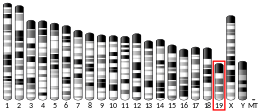
Olfactory receptor 1A1 is a protein that in humans is encoded by the OR1A1 gene.

Olfactory receptor 2W1 is a protein that in humans is encoded by the OR2W1 gene.

Olfactory receptor 51B4 is a protein that in humans is encoded by the OR51B4 gene.

Olfactory receptor 10AD1 is a protein that in humans is encoded by the OR10AD1 gene.

Olfactory receptor 51L1 is a protein that in humans is encoded by the OR51L1 gene.

Olfactory receptor 5P3 is a protein that in humans is encoded by the OR5P3 gene.

Olfactory receptor 10J5 is a protein that in humans is encoded by the OR10J5 gene.

Olfactory receptor 4C6 is a protein that in humans is encoded by the OR4C6 gene.

Olfactory receptor 4D11 is a protein that in humans is encoded by the OR4D11 gene.

Olfactory receptor 51B5 is a protein that in humans is encoded by the OR51B5 gene.

Olfactory receptor 51B6 is a protein that in humans is encoded by the OR51B6 gene.

Olfactory receptor 51M1 is a protein that in humans is encoded by the OR51M1 gene.

Olfactory receptor 52A5 is a protein that in humans is encoded by the OR52A5 gene.

Olfactory receptor 51I1 is a protein that in humans is encoded by the OR51I1 gene.

Olfactory receptor 51I2 is a protein that in humans is encoded by the OR51I2 gene.

Olfactory receptor 5T3 is a protein that in humans is encoded by the OR5T3 gene.

Olfactory receptor 10G4 is a protein that in humans is encoded by the OR10G4 gene.

Olfactory receptor 4K2 is a protein that in humans is encoded by the OR4K2 gene.

Olfactory receptor 51T1 is a protein that in humans is encoded by the OR51T1 gene.

Olfactory receptor family 1 subfamily E member 3 (gene/pseudogene) is a protein that in humans is encoded by the OR1E3 gene.










